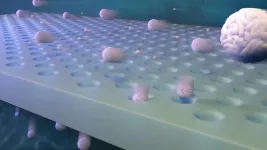(Press-News.org) A new UCLA Health study has found that resilient people exhibit neural activity in the brain regions associated with improved cognition and regulating of emotions, and were more mindful and better at describing their feelings. The same group also exhibited gut microbiome activity linked to a healthy gut, with reduced inflammation and gut barrier.
For the study, rather than examine microbiome activity and composition linked to disease conditions-- like anxiety and depression -- the researchers wanted to flip the script and study the gut microbiome and brain in healthy, resilient people who effectively cope with different types of stress, including discrimination and social isolation.
“If we can identify what a healthy resilient brain and microbiome look like, then we can develop targeted interventions to those areas to reduce stress,” said Arpana Gupta, PhD, senior author and co-director of the UCLA Goodman-Luskin Microbiome Center. This is believed to be the first study to explore the intersection of resiliency, the brain, and the gut microbiome.
Gupta and her team focused on methods to cope with stress because research has shown that untreated stress can increase the risk of heart disease, stroke, obesity, and diabetes. While stress is an inevitable part of life, studying how to handle stress can help prevent developing diseases.
To conduct the study, published in Nature Mental Health, the researchers surveyed 116 people about their resiliency – like trust in one’s instincts and positive acceptance of change -- and separated them into two groups. One group ranked high on the resiliency scale and the other group ranked low. The participants also underwent MRI imaging and gave stool samples two or three days before their scans.
The researchers found that people in the high resiliency group were less anxious and depressed, less prone to judge, and had activity in regions of the brain associated with emotional regulation and better cognition compared to the group with low resiliency. “When a stressor happens, often we go to this aroused fight or flight response, and this impairs the breaks in your brain,” Gupta said. “But the highly resilient individuals in the study were found to be better at regulating their emotions, less likely to catastrophize, and keep a level head,” added Desiree Delgadillo, postdoctoral researcher and one of the first authors.
The high resiliency group also had different microbiome activity than the low resiliency group. Namely, the high resiliency group’s microbiomes excreted metabolites and exhibited gene activity associated with low inflammation and a strong and healthy gut barrier. A weak gut barrier, otherwise known as a leaky gut, is caused by inflammation and impairs the gut barrier's ability to absorb essential nutrients needed by the body while blocking toxins from entering the gut.
The researchers were surprised to find these microbiome signatures associated with the high resiliency group.
“Resilience truly is a whole-body phenomenon that not only affects your brain but also your microbiome and what metabolites that it is producing,” Gupta said. “We have this whole community of microbes in our gut that exudes these therapeutic properties and biochemicals, so I’m looking forward to building upon this research,” Delgadillo said.
The team’s future research will study whether an intervention to increase resilience will change brain and gut microbiome activity. “We could have treatments that target both the brain and the gut that can maybe one day prevent disease,” Gupta said.
A new UCLA Health study has found that resilient people exhibit neural activity in the brain regions associated with improved cognition and regulating of emotions, and were more mindful and better at describing their feelings. The same group also exhibited gut microbiome activity linked to a healthy gut, with reduced inflammation and gut barrier.
For the study, rather than examine microbiome activity and composition linked to disease conditions-- like anxiety and depression -- the researchers wanted to flip the script and study the gut microbiome and brain in healthy, resilient people who effectively cope with different types of stress, including discrimination and social isolation.
“If we can identify what a healthy resilient brain and microbiome look like, then we can develop targeted interventions to those areas to reduce stress,” said Arpana Gupta, PhD, senior author and co-director of the UCLA Goodman-Luskin Microbiome Center. This is believed to be the first study to explore the intersection of resiliency, the brain, and the gut microbiome.
Gupta and her team focused on methods to cope with stress because research has shown that untreated stress can increase the risk of heart disease, stroke, obesity, and diabetes. While stress is an inevitable part of life, studying how to handle stress can help prevent developing diseases.
To conduct the study, published in Nature Mental Health, the researchers surveyed 116 people about their resiliency – like trust in one’s instincts and positive acceptance of change -- and separated them into two groups. One group ranked high on the resiliency scale and the other group ranked low. The participants also underwent MRI imaging and gave stool samples two or three days before their scans.
The researchers found that people in the high resiliency group were less anxious and depressed, less prone to judge, and had activity in regions of the brain associated with emotional regulation and better cognition compared to the group with low resiliency. “When a stressor happens, often we go to this aroused fight or flight response, and this impairs the breaks in your brain,” Gupta said. “But the highly resilient individuals in the study were found to be better at regulating their emotions, less likely to catastrophize, and keep a level head,” added Desiree Delgadillo, postdoctoral researcher and one of the first authors.
The high resiliency group also had different microbiome activity than the low resiliency group. Namely, the high resiliency group’s microbiomes excreted metabolites and exhibited gene activity associated with low inflammation and a strong and healthy gut barrier. A weak gut barrier, otherwise known as a leaky gut, is caused by inflammation and impairs the gut barrier's ability to absorb essential nutrients needed by the body while blocking toxins from entering the gut.
The researchers were surprised to find these microbiome signatures associated with the high resiliency group.
“Resilience truly is a whole-body phenomenon that not only affects your brain but also your microbiome and what metabolites that it is producing,” Gupta said. “We have this whole community of microbes in our gut that exudes these therapeutic properties and biochemicals, so I’m looking forward to building upon this research,” Delgadillo said.
The team’s future research will study whether an intervention to increase resilience will change brain and gut microbiome activity. “We could have treatments that target both the brain and the gut that can maybe one day prevent disease,” Gupta said.
END
Resiliency shaped by activity in the gut microbiome and brain
2024-06-21
ELSE PRESS RELEASES FROM THIS DATE:
Inspired by nature: synthetic nightshade molecule effective against leukemia cells
2024-06-21
Nightshade plants produce a diverse array of compounds with therapeutic potential. Researchers at CeMM have now identified an artificial variant inspired by the Withanolides group that acts highly specifically against leukemia cells. Using state-of-the-art chemical and genetic high-throughput analyses, the team led by Georg Winter not only confirmed its effectiveness but also elucidated its mechanism of action: the molecule disrupts the cholesterol metabolism of tumor cells. The study's findings ...
Promise green hydrogen may not always be fulfilled
2024-06-21
Green hydrogen often, but certainly not always, leads to CO2 gains. This claim is based on research published in Nature Energy by Kiane de Kleijne from Radboud University and Eindhoven University of Technology. “If you calculate the entire life cycle of green hydrogen production and transport, CO2 gains may be disappointing. However, if green hydrogen is produced from very clean electricity and locally, it can really help reduce emissions.”
It is thought that green hydrogen can make ...
Unifying behavioral analysis through animal foundation models
2024-06-21
Although there is the saying, “straight from the horse’s mouth”, it's impossible to get a horse to tell you if it's in pain or experiencing joy. Yet, its body will express the answer in its movements. To a trained eye, pain will manifest as a change in gait, or in the case of joy, the facial expressions of the animal could change. But what if we can automate this with AI? And what about AI models for cows, dogs, cats, or even mice? Automating animal behavior not only removes observer bias, but it helps humans more efficiently get to the right answer.
Today ...
Up to 30 percent more time: Climate change makes it harder for women to collect water
2024-06-21
Climate change could increase the amount of time women spend collecting water by up to 30 percent globally by 2050, according to a new study published in Nature Climate Change. In regions of South America and Southeast Asia, the time spent collecting water could double due to higher temperatures and less rainfall. A team of scientists from the Potsdam Institute for Climate Impact Research (PIK) estimates the large welfare losses that could result from climate impacts and highlights how women are particularly vulnerable to changing future climate conditions. Worldwide, two billion people currently lack access to safe drinking water. The ...
Heart failure in space: scientists calculate potential health threats facing future space tourists in microgravity
2024-06-21
[The following is a guest editorial written by Dr Lex van Loon, an assistant professor at the Australian National University and the University of Twente in the Netherlands. He is co-author of a new Frontiers in Physiology article.]
Space exploration has always captivated our imagination, offering the promise of discovering new worlds and pushing the boundaries of human capability. As commercial space travel becomes more accessible, individuals with various underlying health conditions—including heart failure—may soon be among those venturing beyond Earth’s atmosphere. This raises critical questions about the impact of space travel ...
Experts offer guidance on talking with children about racism at pediatrician's office
2024-06-21
Extensive research shows the link between exposure to racism during childhood and adolescence and increased risks of depression and metabolic health issues, such as obesity, diabetes and heart disease. Conversely, racial socialization, described as behaviors and practices that teach children about race and ethnic identity, has shown potential in mitigating these negative effects, and discussions like these could be effective in pediatric clinics, according to the first expert consensus guidance on this topic published in Pediatrics.
“Over the years, numerous calls to action have been made to address racism in medicine. ...
Drugs for HIV and AIDS trialed as brain tumor treatment for first time
2024-06-21
Drugs developed to combat HIV and AIDS are being trialled for the first time in patients with multiple brain tumours.
Scientists at the Brain Tumour Research Centre of Excellence at the University of Plymouth are conducting a clinical trial to see whether using anti-retroviral medications, Ritonavir and Lopinavir, could help people with Neurofibromatosis 2 (NF2).
The rare inherited genetic condition causes tumours such as schwannoma (which include acoustic neuroma), ependymoma and meningioma which develop ...
Breakthrough in nanoscale force measurement opens doors to unprecedented biological insights
2024-06-21
Groundbreaking research has revealed a new way to measure incredibly minute forces at the nanoscale in water, pushing the boundaries of what scientists know about the microscopic world.
The significant nanotechnology advance was achieved by researchers from Beihang University in China with RMIT University and other leading institutions including the Australian National University and University of Technology Sydney.
The new technique, involving a super-resolved photonic force microscope (SRPFM), is capable of detecting forces in water as small as 108.2 attonewtons—a scale so minute that it compares to measuring the weight of a virus.
Lead ...
Scientists discover new behavior of membranes that could lead to unprecedented separations
2024-06-21
Imagine a close basketball game that comes down to the final shot. The probability of the ball going through the hoop might be fairly low, but it would dramatically increase if the player were afforded the opportunity to shoot it over and over.
A similar idea is at play in the scientific field of membrane separations, a key process central to industries that include everything from biotechnology to petrochemicals to water treatment to food and beverage.
“Separations lie at the heart of so many of the products we use in our everyday lives,” said Seth Darling, head of the Advanced Materials for Energy Water Systems (AMEWS) Center at the U.S. Department of ...
When inflicting pain on others pays off T
2024-06-21
Oh, the joy of inflicting pain upon others. The Germans have a word for it: schadenfreude, meaning “malicious pleasure.” And tapping into its sentiment properly can, ironically, do a lot of good by raising money for charity.
In a groundbreaking paper published in the Journal of Consumer Psychology, UC Riverside School of Business marketing professor and associate dean Thomas Kramer and co-authors articulate and quantify the appeal of schadenfreude (pronounced Sha-den-froid-e) through the lens of marketing psychology.
Through a series of behavioral scenario studies, their paper provides insights ...





